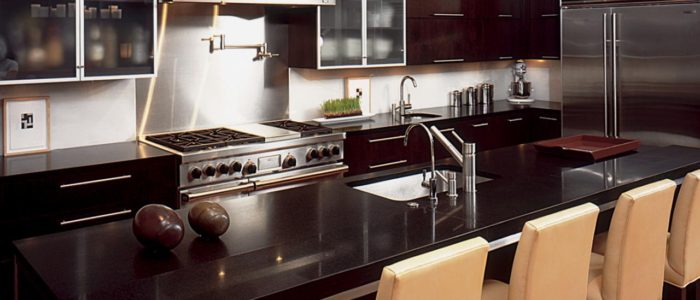
We understand that our customers have a lot of love for both quartz and granite at Affordable Quality Marble & Granite—so much so that the granite-quartz debate is something we often hear about.
Choosing between these stones may be difficult, but it’s not impossible. Many people mistakenly think that granite and quartz are interchangeable, when in fact there are plenty of differences between them.
In this article, we’ll go over the basic details of both stones so you can get an idea of what to expect from them. Along with an overview, we’ll provide a list of pros and cons to help you move toward a decision that you feel good about.
Quartz
Quartz is an engineered stone, which is a quality that many people would include on the “pro” list. It’s nonporous and does not require sealant, which takes a lot away from the maintenance routine for this countertop. It does not stain easily and is unlikely to crack.
The reason quartz is so unlikely to crack is that, while 90 percent of its makeup is composed of natural quartz, the remaining 10 percent is added polymers and resins. These additives create the nonporous surface and also give the stone a bit more flexibility. It’s a win all around.
Here are some pros of this stone:
- Quartz is hard. Its hardness can be compared to that of concrete.
- The patterns are predictable and uniform.
- Seams are very hard to see.
- It’s unfriendly to bacteria.
- It’s stain resistant.
- It doesn’t require much maintenance.
- It can be cleaned by soap and water alone.
- Installation is straightforward.
One thing to note about quartz is that, while the resins in its makeup may make for a more flexible stone, they also reduce the heat resistance and tolerance of direct sunlight. Quartz should never be exposed to direct heat (like hot pots and pans) or be installed outside.
Here are a few more cons of this stone:
- It doesn’t have the natural uniqueness of granite.
- It may become discolored in the sunlight.
- It is susceptible to thermal shock.
- It can be expensive.
Granite
Granite is a 100 percent natural stone that can be found in quarries around the world. It is created when magma cools and hardens under the earth’s surface, and because it is already used to heat and pressure, it has no problem with hot pots and pans. You can use hot pads and trivets to be safe, but granite is very unlikely to become damaged around heat.
Here are some more pros of this stone:
- It’s a recyclable material that doesn’t contain any harmful chemicals.
- It stands up well against heat.
- It’s scratch resistant.
- Comes in many bold patterns and colorations.
Some people really love the standout patterns that granite is known for—subtle is not a word that we’d often use to describe them. If you’re wondering about other downfalls of this stone, here is the list:
- It has busy/inconsistent patterns.
- It must be resealed periodically because it’s a porous stone.
- It is susceptible to chipping.
- It’s very heavy.
Granite, unlike quartz, takes no issue with direct sunlight. It can be installed outside with no problems at all. Although we do recommend lighter shades of granite for outdoor kitchens because dark slabs can become hot to the touch.
Granite vs. Quartz
There are many great qualities of both granite and quartz—one of the main details that people love about these stones is the fact that they can raise the resale value of your home. Buyers all over the nation are looking for stone countertops, so if you have them installed, you stick out (in a good way) against the competition.
Making the Decision
As you can see, there are plenty of things to love about granite and quartz—but there are a few downsides to each material as well. To learn more about these stones or get started on your project, get in touch with us at Affordable Quality Marble & Granite today.

Leave a Reply